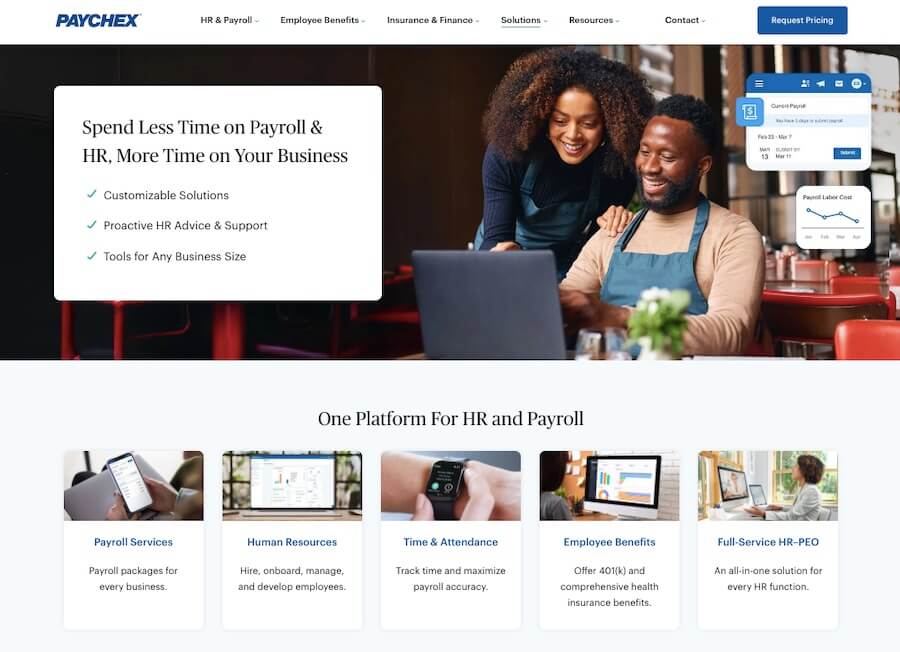Paylocity vs. Paychex Comparison Summary
When you’re choosing between Paylocity and Paychex, you’re essentially deciding between two philosophies of managing payroll and HR.
Paylocity leans on automation and integrated technology, while Paychex is rooted in high-touch service and compliance support. Both are respected names, but the right fit depends on how your team operates, the level of control you want, and how much hand-holding you prefer.
Paylocity vs. Paychex: Product Overview
At a glance, Paylocity is a unified, cloud-based HR and payroll platform designed to automate workflows and consolidate core HR functions in one system.
Paychex, by contrast, takes a service-driven approach, offering a mix of payroll software and outsourced HR solutions through its PEO and HR advisory teams.
Paylocity
Paylocity combines payroll, HR, time tracking, benefits, and talent tools in a single system. It’s ideal for mid-sized organizations that want to streamline operations and cut down on manual work through automation.
The platform is designed for teams that like control, customization, and data transparency. Its philosophy is technology-first: build intelligent workflows that reduce administrative tasks while maintaining compliance behind the scenes.

Paychex
Paychex is built around flexibility and service. It offers everything from simple payroll processing for small businesses to full HR outsourcing for larger organizations. Companies that value personalized support, legal guidance, and compliance expertise often gravitate toward Paychex.
Its platform is stable, straightforward, and backed by a large team of specialists who help with onboarding, tax filings, and benefits setup. The emphasis here is service quality and risk management rather than automation depth.

Paylocity vs. Paychex: Feature Comparison
| Feature | Paylocity | Paychex |
|---|---|---|
| Global Coverage | Supports over 100 countries through its global payroll network (U.S.-centric foundation) | Primarily U.S.-based, limited global support through partner integrations |
| Platform Type | Unified HCM suite combining HR, payroll, and talent modules | Modular system built around payroll, HR add-ons, and PEO services |
| Onboarding Speed | Implementation can take 1–3 weeks depending on complexity and integrations | Core payroll setup can go live within days; full HR packages take longer |
| Contractor Support | Supports 1099 and contractor management with tax filing and reports | Offers 1099 and contractor payroll through standard and advanced packages |
| Payroll Engine | Centralized, automated multi-state payroll with real-time auditing | Localized payroll with strong tax compliance and filing support |
| Benefits | Built-in benefits administration with ACA and COBRA tracking | Offers comprehensive benefits management and PEO-level benefits plans |
| Compliance Tools | Automated compliance alerts and reporting dashboards | HR compliance experts and legal advisory services included in higher plans |
| User Interface | Modern, mobile-friendly dashboard with customizable modules | Simple and reliable interface focused on usability over customization |
| Integrations | Hundreds of native integrations and open API options | Good integrations with accounting and HR tools; fewer open-API options |
| Customer Support | Dedicated onboarding team and live product support | 24/7 customer service with HR and legal experts available for PEO clients |
| Pricing | Quote-based, typically between $20–$30 per employee per month | Transparent base plan ($39/month + $5 per employee); custom for higher tiers |
| Security & Compliance | SOC 2 and GDPR-aligned data protection | Industry-standard data security, compliant with federal and state requirements |
| Scalability | Scales easily across HR, IT, and Finance functions | Scales through service expansion and PEO transition options |
Paylocity vs. Paychex: Key Feature Breakdown
1. Onboarding and Implementation
Paylocity’s onboarding is structured and guided but requires more configuration since it’s a unified platform. You’ll need to map workflows, set up approval chains, and integrate modules if you’re using multiple departments. It’s a better fit for teams that prefer to control the setup process and want detailed customization.
Paychex, on the other hand, focuses on getting you up and running fast. Basic payroll can be live within a couple of days, and their support staff handle most of the administrative setup. For businesses that prefer a more hands-off implementation, Paychex offers a smoother start.
2. Compliance and Legal Support
Paylocity handles compliance through automation, built-in alerts, audit trails, and reporting tools that flag potential issues early. It’s efficient for teams comfortable with self-managing compliance but still need system oversight.
Paychex is more advisory-driven. You get access to compliance experts and, if using their PEO model, dedicated HR professionals who manage filings, audits, and legal changes. For organizations operating across multiple states or industries with complex labor laws, this level of service can be a major advantage.
3. Integrations and Ecosystem
Paylocity’s strength lies in its ecosystem. It offers an extensive integration library and API access, allowing seamless data flow across HR, finance, and IT tools. Because it’s a unified platform, reporting and analytics are centralized and consistent.
Paychex integrates well with popular business tools, especially accounting software, but it’s more limited when it comes to open API access or deep workflow automation. You’ll likely rely more on Paychex’s service team for custom connections.
Paylocity vs. Paychex: Editor’s Note
The choice between Paylocity and Paychex comes down to how you want to manage HR operations. Paylocity is best suited for companies that want control, automation, and efficiency in a single platform. It appeals to teams that prefer a tech-forward approach and are comfortable managing their own workflows once the system is configured.
Paychex, in contrast, is built for organizations that value personalized service and compliance confidence. It’s ideal if your HR team needs external support, operates across multiple states, or wants to outsource complex compliance and benefits administration.
In short, Paylocity prioritizes automation and platform depth; Paychex prioritizes guidance and flexibility. Both can scale, but in different ways. Paylocity through technology, Paychex through service layers.
Paylocity vs. Paychex: Final Recommendation
Choose Paylocity if you:
- Want a modern, all-in-one HR and payroll platform
- Prefer automation over manual processes
- Have internal HR or IT resources to manage configuration
- Need seamless integrations and data analytics
Choose Paychex if you:
- Want dedicated support and compliance expertise
- Operate across multiple states or complex industries
- Prefer modular, transparent pricing
- Value a faster, service-assisted onboarding experience














